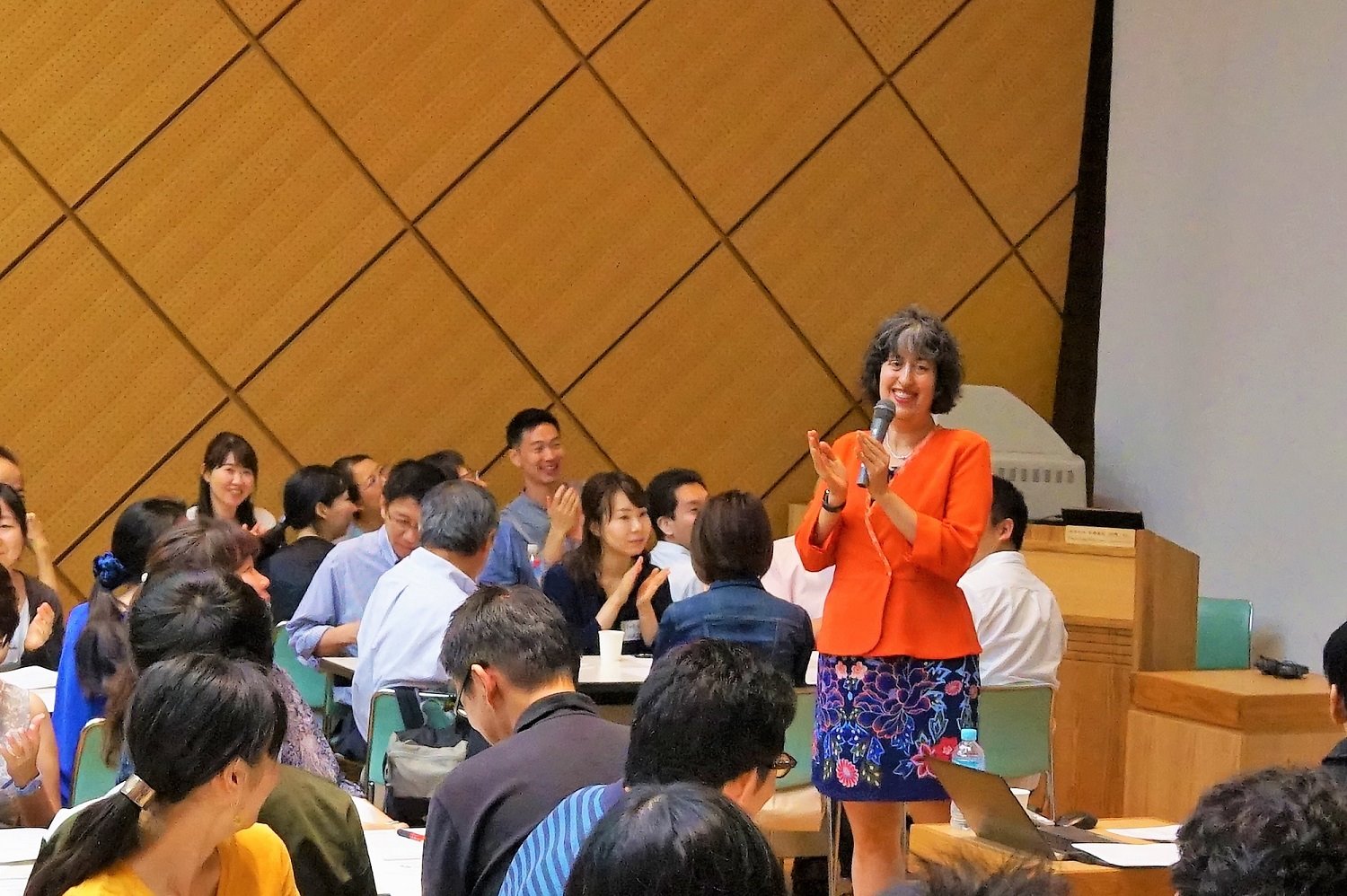Japanese organizations can better utilize the skills and diversity international workers have to offer

This is the sixth and final article in our series "Diversity and the future of the Japanese workplace." Together with The Japan Times, we examine the changing workplace environment and what the future of work may look like as companies embrace diversity, internationalize their human resources and adapt to new working conditions.
The triple whammy of communication
Alex: Since you started working as a consultant 26 years ago, what are the big issues you've noticed Japanese companies have been systematically bad at dealing with?

Rochelle Kopp, founder and managing principal of Japan Intercultural Consulting, is a management consultant specializing in cross-cultural communication, human resources, leadership and organization development. She works with Japanese companies doing business globally and global companies doing business in Japan. A veteran facilitator experienced in delivering training and consulting to participants from around the world, Rochelle frequently leads cross-cultural team buildings and other programs for executives. Rochelle is the author of "The Rice-Paper Ceiling: Breaking Through Japanese Corporate Culture" and over 30 books in Japanese. MASAMI ATAKA
Rochelle: There are a lot of issues around communication. The first part of what I like to call the triple whammy of communication is that the Japanese communication style tends to be fairly indirect. If you look at the scales commonly used in intercultural studies, such as the ones developed by culture expert and INSEAD researcher Erin Meyer, Japan is pretty indirect and non-confrontational.
Second, Japan is a very high-context culture. It's very dependent on shared information, visual information and nonverbal behavior, rather than words. For people from most places in the world, the Japanese seem to be vague, which can lead to a lot of challenges in work situations. What are my expected job duties? What is it that I need to be accomplishing on this project? When things are not clear, it can be challenging because many other cultures tend to have a lot of specificity around work assignments, including very clear definitions of job duties.
The third part of the triple whammy is the language barrier.

Alex Steullet joined the corporate branding department at Cybozu Inc. in 2018. The following year he became the editor in chief of Cybozu's owned media platform, Kintopia. He is originally from Switzerland and has been living in Japan since 2016. Prior to moving to Japan, Alex worked as a program officer for Switzerland's Federal Department of Foreign Affairs. He holds an LLM in Human Rights Law from the University of Nottingham. Alex is fluent in English and French, and proficient in Japanese. DAN TAKAHASHI
Alex: That's an interesting segue to one of my other questions. Is the onus on Japanese companies to adapt their way of functioning to better suit international workers, or is it on international workers to adapt to the Japanese way?
Rochelle: The short answer is that everyone has to make some effort. Everyone has to either be making concessions, compromising, adjusting or revising their expectations.
As for the long answer, let me give you two examples of what doesn't work. A U.S. firm that was entering the Japanese market wanted me to do a seminar for them about how to be successful. They said it's really important for them to preserve their corporate culture of constructive controversy, confrontation to the point that discussions in their meetings sound like arguments, but without anyone taking it personally. "When we go into Japan, we only want to hire Japanese people who are comfortable doing things our way," they said. That way of thinking isn't a recipe for success when doing business in another culture.
I've also seen the same phenomenon happen from the opposite direction. A couple of years ago, a woman in her 20s who worked for a large well-known Japanese firm attended my seminar in Tokyo. She was originally from Korea but spoke fluent Japanese. She recounted that when she was looking for a job, she had heard a speech by the president of her company who said: "By hiring non-Japanese employees, we are getting a breath of fresh air in our firm. We want them to revitalize how we do things." She joined the company, but every time she did something differently than a Japanese person might, she got slapped down. She voiced her frustration during my seminar, saying "If they wanted someone who acts just like a Japanese person, why did they go to the trouble of hiring me?"
As you can see in both examples, just expecting the other group to change and be exactly like you is not really fair or realistic. It's also losing out on the positive things that you can gain from people being themselves and all the diversity you have in your company.
Vicious cycle
Alex: Why are Japanese companies still so reluctant to hire non-Japanese workers?
Rochelle: Basically what happens is a vicious cycle. Japanese firms tend to say, "Since non-Japanese are just going to leave soon anyway, we'll only give them specialized or peripheral jobs." Then the non-Japanese workers see that they're not really involved in the core activities of the company, feel under-valued, and perceive a lack of advancement opportunities. They eventually leave, perpetuating the high turnover rate and confirming the stereotype.

Rochelle Kopp speaks during a seminar at Vital Japan in 2018. TATSUYA KOBAYASHI
Alex: What's the solution then to break the cycle and create an environment in which international workers won't want to quit?
Rochelle: The root cause of the problem isn't issues that only international employees face, but that all employees face. Recently, when I held an open seminar for non-Japanese working in Japan, I had them make lists of what they like about working in a Japanese company and what they find challenging. They mentioned things like company cultures being slow to change, the difficulty for individuals to make an impact, and lack of productivity.
These things also frustrate younger Japanese. And indeed when I posted the list on Twitter, many people replied, "I'm Japanese, and I feel exactly the same way."
If Japanese companies made more of an effort to address these recurring issues rather than thinking of them as just being the concerns of non-Japanese workers, they could create a better environment for everyone.
Alex: I remember once including in an article I wrote that having more diversity in higher positions could help with innovation. One of the responses I got was that companies like Toyota and Nintendo were really successful globally, despite having pretty homogenous workforces.
Rochelle: That's actually not true with Toyota. Sometime between 15 and 20 years ago, Toyota, which is one of my clients, told me that they realized there was no way they could staff their global operations relying solely on Japanese expatriates. So, they created detailed internal plans for how they were going to train their non-Japanese employees around the world to understand the Toyota Production System and the Toyota culture, and give them the necessary work experiences, so that they could give key posts to non-Japanese. Now they have overseas factories that for years have had non-Japanese managers running them. They've even brought a lot of non-Japanese employees from their foreign operations to occupy high-level posts in Japan.
Alex: I see, so their global success actually came from strategically placing non-Japanese workers in key posts. For many Japanese companies, the highest post available to non-Japanese workers is head of all non-Japanese workers, so moving forward I hope more companies will follow Toyota's thinking.
Foreign women working in Japan
Alex: What are the specific challenges of working in Japan as a foreign woman?
Rochelle: I get asked this a lot, due to the reputation that Japan has for sexism. I do think it's important to approach perceived workplace discrimination with multiple hypotheses. I see many cases where women face challenges when working with Japanese clients or colleagues that they attribute to their being female. Oftentimes, there's actually an alternative, perhaps more cultural explanation.
For me, personally, I have had more trouble with sexist American men than with Japanese men. I remember early in my career, an American manager at one of my client companies called me "kiddo." I've never been referred to with that kind of disrespectful term when working with Japanese.
Also, when you're a foreign woman working in Japan, there aren't always the same expectations applied to you as would be for a Japanese woman. I remember back when I was working at a Japanese bank, I could be really outspoken about things. For me, it was tolerated, whereas the Japanese woman who sat next to me could not get away with saying those same things.
The American female communication style is also much closer to the general Japanese business communication style than the American male style. I tell American women that their natural style can potentially be an advantage when working with Japanese counterparts.
Alex: According to academic research, stereotypical masculine traits such as aggressiveness, strength and decisiveness are often seen in the West as desirable leadership traits. Is that also the case when it comes to managers in Japan?
Rochelle: It's not necessarily the same aggressive flavor as in Western countries, but in Japan managers are indeed expected to act like men. It's a challenge for Japanese women. I've had Japanese women tell me it's hard for them to find the right language to use to be effective in leadership roles. Because if you use overly feminine language in Japanese, it doesn't sound like you're a leader - you could end up sounding like someone's mom and that probably isn't the image you're going for.

Alex Steullet interviews Rochelle Kopp in December.
Alex: Is there also a cultural difference in the way sexism is expressed between different cultures?
Rochelle: There's a general feeling in the U.S. that there are certain things that you shouldn't say. In Japan it's more socially acceptable to say things that are more sexist or just more gendered. I remember once going to buy a box of Pocky (chocolate biscuit sticks) at a Japanese store. On the package, it said that they were "Men's Pocky." Just to make sure, I went up to the cashier and asked if it was OK for me to buy them! (laugh)
Afterwards, I asked a Japanese friend of mine, "Why does it say 'men's' on the package?" The explanation I got was that it uses bitter dark chocolate which supposedly appeals more to a male palate.
I also have a Japanese friend who has a bit of a sweet tooth. He went to a coffee shop in Tokyo by himself one day and ordered a chocolate sundae, but the server looked confused. It was as if it didn't make sense for a middle-aged businessman to order something like that. There is a gender stereotype in Japan that men don't eat sweet things.
Alex: I had that same experience! I went to Mister Donut the other day for an afternoon snack, and I found myself standing in line with a dozen women, and no men in sight. I asked around and apparently Japanese men who eat donuts risk appearing feminine.
Is diversity really necessary?
Alex: Aside from the often-discussed benefit of increased creativity, what are some other reasons Japanese companies should consider hiring non-Japanese employees?
Rochelle: There are many different reasons for Japanese firms to hire non-Japanese employees. The most obvious is that in order to expand to other countries, the company will want people who speak that language and know that culture.
Another area where Japanese firms can really benefit from non-Japanese employees is access to rare skills. For example, in Japan right now, a lot of firms in software-related areas need cutting-edge skills for making high-end websites that have complicated back-end functions, or making highly sophisticated apps. Unfortunately, Japanese universities are not producing enough skilled software developers to fulfill the demands of the Japanese market.
For a lot of Japanese firms in high-tech areas, they can have much better access to world-class talent if they look outside of Japan.
Alex: Interesting! So diversity isn't just about creativity, but also access to the talent it takes to compete on the global market!
I'm afraid that's all the time we have for today. Our conversation has helped me realize just how essential multicultural awareness is to understanding social interactions in complex situations and unlocking a brighter future for Japanese businesses. I thoroughly enjoyed this talk, thank you very much.
Written by Sayuri Daimon. Edited by Alex Steullet, Ade Lee, Mina Samejima, and The Japan Times. Photographs courtesy of Rochelle Kopp, The Japan Times and Dan Takahashi.
Writer
Editor

Alex Steullet
Alex is the editor in chief of Kintopia and part of the corporate branding department at Cybozu. He holds an LLM in Human Rights Law from the University of Nottingham and previously worked for the Swiss government.




